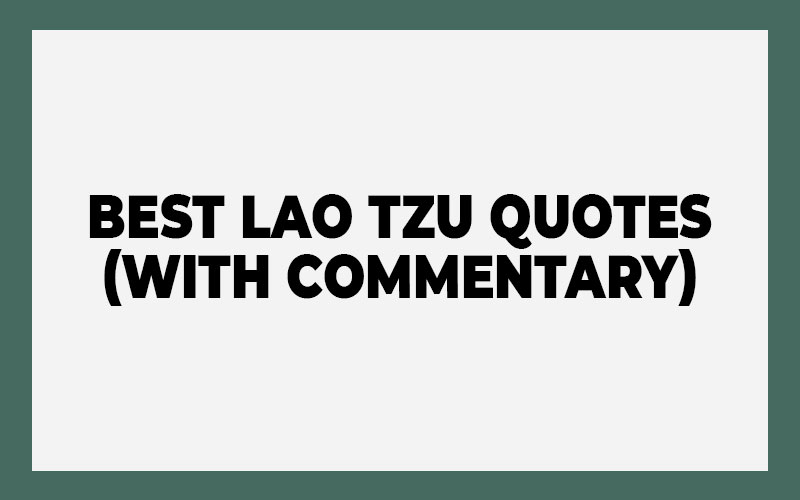Lao Tzu, also known as Laozi, was a Chinese philosopher and writer who is credited with founding the philosophical system of Taoism. His teachings focus on achieving harmony with nature and living a simple and peaceful life. Here are 25 Best Lao Tzu Quotes.
Lao Tzu Quotes
“The journey of a thousand miles begins with one step.” – Lao Tzu
This quote conveys the importance of taking that initial step towards progress or change. It reminds us that every great journey starts with a single action, no matter how small. By taking that first step, we set ourselves on a path towards growth and transformation.
“Mastering others is strength. Mastering yourself is true power.” – Lao Tzu
In this quote, Lao Tzu emphasizes the power of self-mastery and self-control. While it may be impressive to exert control over others, true strength lies in one’s ability to govern and discipline their own thoughts, emotions, and actions. This quote encourages individuals to focus on inner growth and personal development.
“The wise man does not lay up his own treasures. The more he gives to others, the more he has for his own.” – Lao Tzu
This quote highlights the value of selflessness and giving. Lao Tzu suggests that by sharing our resources, time, and love with others, we create a cycle of abundance and generosity. The act of giving not only benefits those around us but also enriches our own lives in countless ways.
“Silence is a source of great strength.” – Lao Tzu
Lao Tzu emphasizes the power of silence and the importance of stillness in this quote. It suggests that finding moments of quiet contemplation and inner calm can provide us with clarity, insight, and renewal. Silence can be a valuable tool for self-reflection and personal growth.
“A journey of a thousand miles must begin with a single step.” – Lao Tzu
This quote serves as a reminder that any significant undertaking or achievement requires us to start small and take that first courageous step. It encourages us to overcome inertia and fears of failure, knowing that every successful journey starts with a single act of courage.
“Nature does not hurry, yet everything is accomplished.” – Lao Tzu
Lao Tzu observes the effortless and harmonious way nature unfolds in this quote. It underscores the importance of patience, allowing things to progress at their own pace. It serves as a gentle reminder that rushing and forcing outcomes may disrupt the natural flow of life.
“The best fighter is never angry.” – Lao Tzu
Lao Tzu suggests that true strength does not lie in anger or aggression but in maintaining a calm and composed state of mind. This quote conveys the notion that self-control and emotional intelligence are essential in resolving conflicts and achieving peaceful resolutions.
“Being deeply loved by someone gives you strength while loving someone deeply gives you courage.” – Lao Tzu
In this quote, Lao Tzu speaks to the dual nature of love. He acknowledges that being loved unconditionally by someone empowers us, while wholeheartedly loving another person requires strength and vulnerability. Love, in its various forms, serves as a catalyst for personal growth and transformation.
“Kindness in words creates confidence. Kindness in thinking creates profoundness. Kindness in giving creates love.” – Lao Tzu
This quote by Lao Tzu emphasizes the transformative power of kindness. It highlights that acts of kindness not only impact others but also nurture our own emotional well-being. This quote serves as a reminder that simple acts of kindness can have a profound and lasting impact on others and ourselves.
“He who knows that enough is enough will always have enough.” – Lao Tzu
Lao Tzu speaks to the concept of contentment and gratefulness in this quote. It suggests that recognizing and appreciating what we already have is the key to true abundance and satisfaction. This quote serves as a reminder to embrace gratitude and resist the allure of constantly seeking more.
“Watch your thoughts; they become words. Watch your words; they become actions. Watch your actions; they become habits. Watch your habits; they become character. Watch your character; it becomes your destiny.” – Lao Tzu
This profound quote by Lao Tzu highlights the interconnectedness of our thoughts, words, actions, habits, character, and ultimately, our destiny. It emphasizes the importance of self-awareness and encourages us to cultivate positive thoughts and behaviors to shape our future.
“If you do not change direction, you may end up where you are heading.” – Lao Tzu
In this quote, Lao Tzu emphasizes the need for self-reflection and the willingness to change course when necessary. It reminds us of the danger of simply going with the flow without considering the potential outcomes. This quote encourages individuals to take ownership of their lives and make conscious choices.
“When I let go of what I am, I become what I might be.” – Lao Tzu
Lao Tzu speaks to the transformative power of letting go and embracing change in this quote. It suggests that by releasing attachments to limiting beliefs and self-identifications, we open ourselves up to new possibilities and growth. This quote serves as a reminder to embrace the process of self-discovery and personal evolution.
“Do the difficult things while they are easy, and do the great things while they are small. A journey of a thousand miles must begin with a single step.” – Lao Tzu
This quote encourages us to tackle challenges and seize opportunities when they are manageable and within reach. By taking advantage of the present moment and breaking down monumental tasks into smaller steps, we increase our chances of success. It emphasizes the importance of taking action and starting the journey towards our goals.
“Those who have knowledge, don’t predict. Those who predict, don’t have knowledge.” – Lao Tzu
This quote by Lao Tzu highlights the limitations of making predictions or assumptions based on incomplete knowledge. It emphasizes the importance of seeking wisdom and understanding before attempting to make accurate forecasts or projections. It encourages individuals to question assumptions and seek deeper understanding before drawing conclusions.
“Do you have the patience to wait until your mud settles and the water is clear?” – Lao Tzu
Lao Tzu advises patience and stillness in this quote, using the analogy of muddy water becoming clear over time. It encourages individuals to resist the urge for instant answers and clarity, allowing things to naturally settle and reveal their truth. This quote speaks to the importance of allowing space for reflection and untangling complexities.
“Simplicity, patience, compassion, these are your greatest treasures.” – Lao Tzu
This quote by Lao Tzu highlights the true treasures in life: simplicity, patience, and compassion. It reminds us that material possessions and external accomplishments pale in comparison to cultivating qualities that foster inner peace and genuine connections with others. This quote serves as a reminder to prioritize values that bring true fulfillment.
“New beginnings are often disguised as painful endings.” – Lao Tzu
Lao Tzu recognizes the transformative potential hidden in moments of loss or endings. This quote suggests that what may initially appear as a painful or challenging experience can lead to new beginnings and opportunities for growth. It encourages individuals to embrace change and have faith in the possibilities that arise from endings.
“Life is a series of natural and spontaneous changes. Don’t resist them; that only creates sorrow. Let reality be reality. Let things flow naturally forward in whatever way they like.” – Lao Tzu
This quote speaks to the inevitability of change and the importance of acceptance. Lao Tzu advises against resisting the natural flow of life but instead surrendering to its rhythm and embracing the unpredictable. It encourages individuals to adapt and find peace in the ever-changing nature of reality.
“Act without expectation.” – Lao Tzu
This quote emphasizes the importance of detached action, where one does not perform actions with the expectation of specific outcomes. Lao Tzu suggests that engaging in activities without ulterior motives or attachments leads to a more fulfilling and authentic experience. It encourages individuals to focus on the present moment and fully immerse themselves in the task at hand.
“The more that you give, the more that you have.” – Lao Tzu
In this quote, Lao Tzu highlights the paradoxical nature of giving. It suggests that the act of giving is not depleting but rather enriching. The more we give, whether it is love, kindness, or resources, the more abundant our lives become. This quote serves as a reminder of the profound impact generosity can have on both the giver and the recipient.
“To the mind that is still, the whole universe surrenders.” – Lao Tzu
Lao Tzu speaks to the power of a calm and quiet mind in this quote. It suggests that by attaining a state of inner stillness and silence, one can gain a deeper understanding of the world and tap into greater wisdom. This quote encourages individuals to seek inner peace and tranquility in order to connect with the vastness of the universe.
“If you realize that all things change, there is nothing you will try to hold on to. If you are not afraid of dying, there is nothing you cannot achieve.” – Lao Tzu
This quote by Lao Tzu speaks to the impermanence of life and the importance of embracing change. It suggests that by accepting the inevitability of change and letting go of attachments, one can achieve great things. It encourages individuals to face fear directly and not let it hinder their potential.
“When you are content to be simply yourself and don’t compare or compete, everyone will respect you.” – Lao Tzu
In this quote, Lao Tzu underscores the importance of self-acceptance and non-comparison. It suggests that by being authentic and true to oneself, others will naturally recognize and appreciate one’s inherent worth. This quote serves as a reminder to focus on personal growth and staying true to one’s values rather than seeking external validation.

